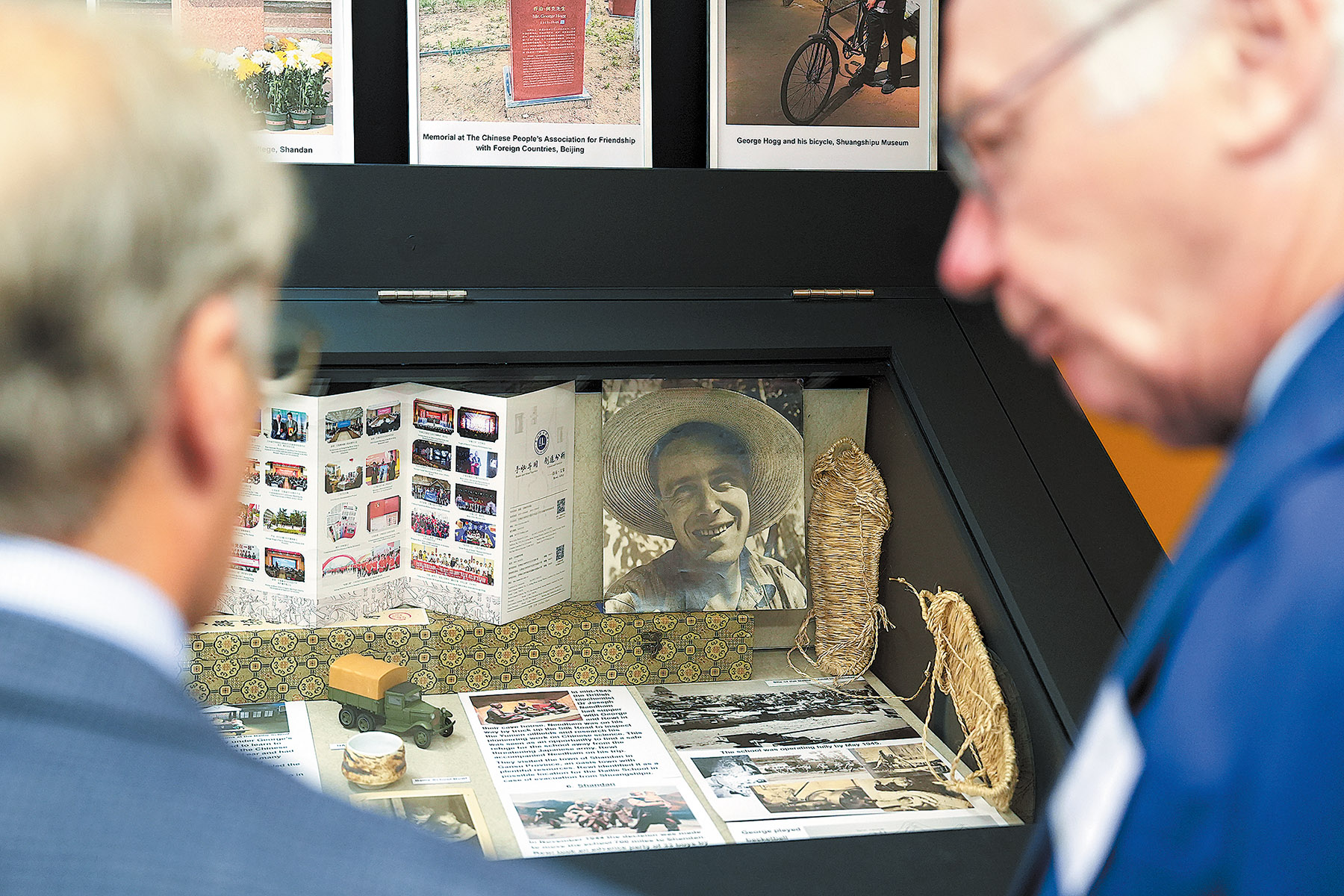Briton’s wartime sacrifices in China embody enduring people-to-people relations

Editor’s note: This year marks the 80th anniversary of the victory in the Chinese People’s War of Resistance Against Japanese Aggression (1931-45) and the World Anti-Fascist War. This series of special reports by China Daily presents how and why China cherishes and keeps revisiting the wartime friendship with its foreign friends.
Eighty years ago, 30-year-old British journalist and educator George Hogg played an active role in China’s resistance against the Japanese invaders, ultimately sacrificing his young life while leading the evacuation of Chinese students to a safer location in northwestern China’s Gansu province in 1945.
He died shortly before the Japanese army surrendered that year, bringing an end to World War II.
In 1938, Hogg arrived in China and first worked as a journalist for media outlets as the drums of war grew louder.
During President Xi Jinping’s state visit to the United Kingdom in 2015, he mentioned Hogg’s story when addressing a welcoming banquet hosted by Queen Elizabeth II.
Xi praised Hogg for earnestly devoting himself to the Chinese People’s War of Resistance Against Japanese Aggression (1931-45), noting that Hogg wrote articles about the Japanese invaders’ atrocities.
As allies in World War II, China and the UK supported each other through weal and woe, marking a wonderful chapter in the history of China-UK friendship, Xi said.
Hogg’s book, I See a New China, was well received overseas for featuring what he saw and heard from people of all walks of life in the nation, many of whom were homeless.
“I See a New China is the story of the Chinese common man, hungry and oppressed … and yet ever patient, hardworking and ingenious,” said a book review by Mark Gayn in the New York Times on July 2, 1944.
Hogg’s footprints covered many parts of China, including war-torn frontlines and Shaanxi province’s Yan’an, which was a revolutionary base of the Communist Party of China.
He joined the Chinese Industrial Cooperatives and later became headmaster of the Bailie School in Shuangshipu in Shaanxi, a school focused on vocational education for young people to help build sectors such as textiles and machinery.
Rising war tensions forced the school to move, and Hogg oversaw and escorted the transfer of the students and essential machinery to Shandan in Gansu province in 1944. They trekked the mountainous slopes while enduring snow and storms.
Calling Hogg “an old friend of the Chinese people”, Jiang Jiang, vice-president of the Chinese People’s Association for Friendship with Foreign Countries, said, “Hogg’s footsteps serve as a vivid testament to the friendship between the Chinese and British people, as well as a profound interpretation of a shared future for humanity.”
During a visit to China earlier this year, Mark Aylwin Thomas, a nephew of Hogg and author of the biography Blades of Grass: The Story of George Aylwin Hogg, tried trekking like his uncle did more than 80 years ago.
“We were walking freely, with all of our baggage in the cars accompanying us, but they were hauling wheelbarrows, and helping the little horses and mules pulling these huge carts with 20 tons of essential machinery. They were pushing through very steep slopes. It was a very arduous time,” he said.
An exhibition commemorating Hogg kicked off last week in his hometown of Harpenden, a town in Hertfordshire, an English county neighboring London.
David Richard Kendall, a trustee of the Harpenden & District Local History Society, said the exhibition aims to educate people about what Hogg had achieved, as Hogg “is not well-known in England but is very well-known in China”.
“We cover what he did as a journalist, in helping establish cooperative factories, and in educating and rescuing Chinese orphans from the Japanese invaders,” Kendall said.
Hogg’s contribution as a volunteer “is inspirational for younger people, as they can see that you can contribute to the lives of others in such a big way even though you are only in your twenties, which is what George Hogg was,” he added.
When asked about how to better engage young people to carry forward the friendship, Zoe Reed, former chair of the Society for Anglo-Chinese Understanding, or SACU, said, “Young people who joined SACU said the China portrayed in Western media is not the China they experienced when they came and lived or studied here for a year.”
She noted that engaging the youth is quite complicated and said, “Formal occasions would not particularly attract young students, but showing the fun times people have in Beijing, the good stuff in Shanghai — this will attract and encourage people to want to come.”
Reed said, “The world may get more complicated politically, but we can always build bridges of understanding at the people-to-people level.”
In a social media post last week, Zheng Zeguang, Chinese ambassador to the UK, wrote, “As the 80th anniversary of WWII approaches, George Hogg’s legacy reminds us: true friendship knows no borders — and history still speaks.”
Yang Mingze, Wu Yuexuan and Xing Yi contributed to this story.
Contact the writers at zhangyunbi@chinadaily.com.cn


